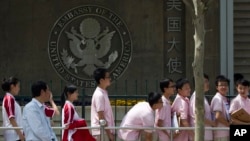Student Union
Young Bernie Sanders Supporters Wait for Reward
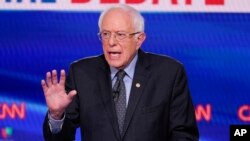
Young people who avidly supported Senator Bernie Sanders for president before he urged them to vote for Democratic former Vice President Joe Biden in the November 3 election are waiting to see what rewards Sanders might reap.
“I thought that was a really good show of leadership back in March or so, and I'd love for him to just keep being a figurehead on some of these major progressive legislative actions going forward,” said Peter Ditzler, a senior at Temple University in Philadelphia, who was the co-leader of Temple for Bernie.
Sanders, an independent senator from Vermont, is an advocate for the environment and health care, issues that many young voters between 18 and 29 feel passionately about.
Sanders dropped out of the presidential race April 8 and asked his supporters to endorse Biden, who defeated Republican President Donald Trump in the election.
"Bernie Sanders. He [was] the only candidate truly dedicated to including students and young people in the movement. We need to transform our nation,” tweeted Christopher Badillo in response to the question, “What candidate do you think excites young people the most?”
Sanders reached young voters by campaigning for universal health care, free public college tuition and cancellation of student debt. On the Green New Deal — a legislative package on the environment with an emphasis on sustainability — he partnered with Alexandria Ocasio-Cortez. The New York congresswoman, 31, represents a new and younger wave of governmental leadership to many younger voters.
“I think young people have loved very old candidates, and they have sometimes loved very young candidates,” said Kei Kawashima-Ginsberg, director of the Center for Information and Research at Tufts University (CIRCLE) in Medford, Massachusetts.
“Values and authenticity are very important,” she said.
“I think what stood out to me was his authenticity,” said Ditzler. “Every time he spoke, it really felt genuine.”
Green agenda
The Green New Deal calls for making energy systems 100% renewable, providing the Green Climate Fund with $200 billion and rejoining the international Paris Agreement on climate change.
“With the Green New Deal, I think that's really kind of what really spoke to me because I am pretty concerned about the environmental impacts of climate change and us as a country working to mitigate any kind of oncoming damage and destruction from climate change,” said Ditzler.
“I think Bernie recognized the anxieties that come with a huge economic transition that the Green New Deal would require,” he said.
Sanders’ campaign included support for universal health care, a leading issue for young people in the presidential election.
“All Americans are entitled to go to the doctor when they're sick and not go bankrupt after staying in the hospital,” Sanders said on his campaign website.
Sanders is not a member of either major party but usually sides with the Democratic Party. He is serving his third term in the Senate.
He has served longer than any other independent member of Congress in the United States; he has been a senator since 2007 and spent 16 years in the House of Representatives before that.
Once Sanders dropped out of the presidential race, many people questioned whether young voters would turn out for Biden. After Sanders endorsed Biden, about 89% of Sanders supporters said they would vote for Biden, according to YouGov data from August.
Disappointment
“It's tough because, I mean, I voted for Biden and I'm already getting extremely disappointed with some of his Cabinet picks and the people he's intending to appoint to his transition team and everything,” said Ditzler.
“I think the media and a lot of people are praising [Biden] for picking a very diverse Cabinet, in terms of he's picking a lot of women and people of color,” said Ditzler. “I think that's great and all, but if you look at their track records, they haven't exactly been great at fighting against systems of oppression like Bernie's campaign and movement were kind of hoping to dismantle.”
Sanders has expressed interest in joining Biden’s Cabinet as labor secretary.
"If I had a portfolio that allowed me to stand up and fight for working families, would I do it? Yes, I would," Sanders told CNN's Wolf Blitzer in an interview on November 11.
Biden hinted in a recent interview with NBC News that he would rather have Sanders continue his role in the Senate than join the new administration.
Holding Biden accountable
Ditzler said he would love to see Sanders continue to have a large role in the Senate.
“He helped us help educate a whole generation on what we could fight for, what's reasonable to fight for, and he offered explanations for why we would all be better off if we fought for someone we didn't know,” said Ditzler.
“Since young people have less of a tendency to identify with a party as older voters, I do think that you'll continue to see young people really pressing on issues and holding Biden accountable to things that he said during his campaign,” said Abby Kiesa, CIRCLE’s director of impact at Tufts.
Biden is to be sworn in on January 20.
See all News Updates of the Day
- By VOA News
International students discuss US campus culture shock

International students at De Anza College in Cupertino, California, talked about culture shock in an article in La Voz News, the student newspaper.
"It felt like a major culture shock. Everything was so different, from academics to mannerism," said a student from Mexico.
Read the full story here.
These are the most expensive schools in the US
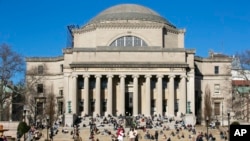
High tuition costs along with housing and food expenses can add up for students at U.S. colleges and universities.
MSNBC looked at the most expensive schools in the country, with one costing more than $500,000 for a bachelor’s degree. (June 2024)
Uzbekistan students admitted into top US universities

Students from Uzbekistan are among the international students admitted to top colleges and universities in recent years.
Gazata.uz profiled some of the Uzbekistan students attending Harvard, Brown, Princeton and other U.S. universities. (June 2024)
- By Stella Hsu
Reports of visa checks, deportations worry Chinese STEM students in US
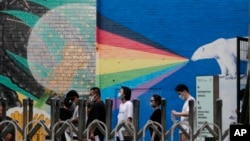
Geopolitical tensions and growing competition in tech between the United States and China appear to be spilling over into academia despite commitments from the world’s two biggest economies to boost people-to-people exchanges.
The United States remains the top choice for Chinese students seeking to study abroad with nearly 300,000 studying in American colleges and universities during the 2022-2023 school year. But reports of some cases that students and professors are facing extra scrutiny while passing through immigration and the deportation of others are raising concerns.
For Chen Xiaojin, a doctoral student studying semiconductor materials at a university in the Washington, D.C., metropolitan area, it has been six years since she returned to her hometown of Beijing.
At first, it was the COVID-19 pandemic that kept her from going home. But over the past two years, she has been deterred by accounts of Chinese students majoring in science and engineering being required to reapply for their visas upon returning to China.
She also says she is worried by reports over the past six months of Chinese students being deported, even at nearby Dulles Airport.
"My current research is relatively sensitive, and my boss [adviser] is getting funds from the U.S. Department of Defense, making it even more sensitive,” she told VOA. "I am afraid that I won't be able to return after I go back [to China]."
Chen says that if she did return to China, she would have to apply for a new visa.
In a report late last month, Bloomberg said it had found at least 20 Chinese students and scholars with valid visas who were deported at U.S. Customs since November and barred from reentry. The U.S. Customs and Border Protection Agency does not release relevant data.
Immigration attorney Dan Berger represented one Chinese student who was deported late last year. He tells VOA Mandarin that the student studied biological sciences at Yale University and was about to complete her doctorate.
She visited her family in China and got a new visa but was deported by customs at Dulles Airport and barred from reentering the country for five years. Berger said he did not see anything suspicious in the transcript of the conversation between the student and the customs officer.
"We have seen what seems like a pattern over the last six months of Chinese PhD students being turned around…. more than I've seen in quite a while," he said.
Matthew Brazil, a fellow at the Jamestown Foundation, said neither country seems willing to explain the situation. However, he believes that in most cases, the United States must have valid reasons for blocking visa holders from entering the country.
In some cases, the student’s background may not match what is written on the visa application. In other cases, customs agents may also find something that the State Department missed, and once they see it, they are responsible for taking action.
"I wish the Chinese side would be specific about their students who were refused entry,” he said. “The fact that both sides are mum on details and that the Chinese side is engaged with the usual angry rhetoric means that each has security concerns. And that says to me that there was good reason for the U.S. to stop these particular applicants."
Brazil also sees a connection between the entry denials and export control regulations issued by the United States in October 2022 that restrict China's ability to obtain advanced computing chips, develop and maintain supercomputers, and manufacture advanced semiconductors.
U.S. Customs and Border Protection is one of the law enforcement agencies authorized to investigate violations of export control regulations, he said.
"Beijing's intelligence agencies are known to focus attention on PRC [People's Republic of China] students and scientists headed abroad who study or work on dual-use technologies controlled under the Export Administration Act — compelling Chinese students and scientists to report on what they've learned when they return to China on holiday,” he said. “This has been true for decades."
Bill Drexel, a fellow for the Technology and National Security Program at the Center for a New American Security, said the U.S. government did find some cases where students tried to steal strategic technology for China.
"I think it would both not be surprising that they found some really questionable or incriminating evidence for some students,” he said. “It would also not be surprising if, in their hunt for really solid evidence, they also may have made some mistakes on other students.”
Drexel adds that “it’s just kind of an unfortunate fact of the time that we live in and the tactics that the CCP uses when it comes to these measures."
In a post on X in early May, U.S. ambassador to China Nicholas Burns tried to dispel concerns about visas and entry to the United States for students and scholars. In the post, he said "99.9% of Chinese students holding visas encounter no issues upon entering the United States.”
In an interview with The Wall Street Journal Monday, Burns said it is China that is making it impossible to promote people-to-people ties. Burns told the Journal that students attending events sponsored by the United States in China have been interrogated and intimidated.
He also said that since U.S. President Joe Biden and China’s leader Xi Jinping held their summit in San Francisco last year, China’s Ministry of State Security and other agencies had interfered with Chinese citizens’ participation at some 61 events.
At a regular briefing on Wednesday, Chinese Foreign Ministry spokesperson Mao Ning dismissed those accusations, saying that they did not “reflect reality" and that went against key understandings reached by both countries’ presidents in San Francisco.
“The United States, under the pretext of 'national security,' unjustifiably harasses, interrogates, and deports Chinese students in the U.S., causing them significant harm and creating a severe chilling effect,” Mao said. “The image of the United States in the minds of the Chinese people fundamentally depends on the actions of the United States itself.”
Drexel said he believes Burns’ comments about visas and students' willingness to study in the U.S. still ring true.
“On balance, it's still the case that American universities are overwhelmingly warm towards Chinese students and want them in large numbers," he said.
However, Berger, the immigration lawyer, is concerned about the chilling effect recent cases involving Chinese students could have.
"In general, we are being more careful about advising Chinese graduate students in STEM fields about traveling and letting them know that there is some small risk,” he said.
Even though the risk is small, it does seem to be real at the moment, he said.
Adrianna Zhang contributed to this report.
US federal judge blocks new regulation targeting for-profit colleges
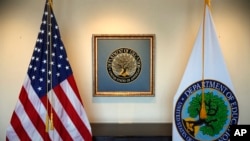
A federal judge in Texas has blocked a regulatory provision targeting for-profit colleges that was scheduled to take effect in July 2024.
Times Higher Education reports that the rule, which would affect student loans, was challenged by for-profit institutions. (June 2024)






